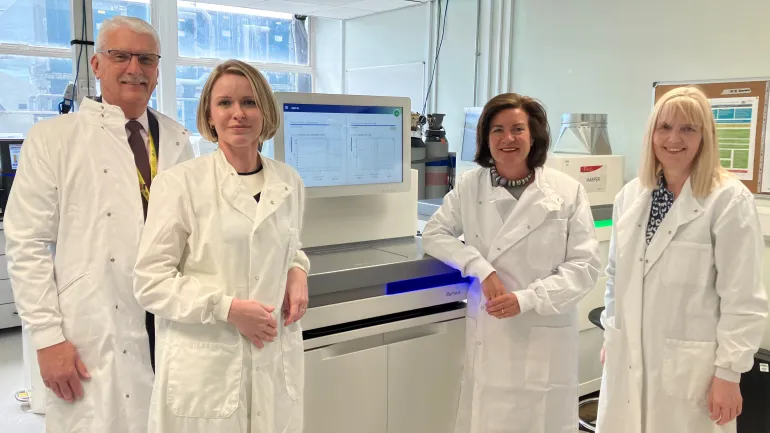Inspiring Innovation is our round-up of news from a thriving innovation landscape collated by our Sector Intelligence team, now with a focus on news and updates relating to our priority area, cancer. Fuelling our ambitions to elevate Wales as a place of choice for health and social care innovation and investment.

In this edition, you’ll learn about the development of lollipops to diagnose mouth cancers, a new blood test that identifies cancer in patients previously diagnosed with Cancer of Unknown Primary, and a forthcoming prostate cancer screening programme.
Researchers win funding to develop ‘lollipops’ to diagnose mouth cancers
A research team from the University of Birmingham are developing smart hydrogels that can safely collect saliva proteins that indicate early stages of oral cancers, without the need for invasive procedures such as biopsies.
They've been awarded a £350,000 grant from Cancer Research UK and the Engineering and Physical Sciences Research Council to translate this research into a clinical diagnostic tool. As the hydrogel can be easily moulded into solid shapes, the team are investigating the potential of developing the gel into flavoured lollipops to collect proteins in a patient’s saliva which indicate the presence of oral cancer.
Dr Iain Foulkes, Executive Director of Research and Innovation at Cancer Research UK, said:
“Biopsies and nasoendoscopy are the gold standard for diagnosing mouth cancer, but it requires great skill to carry out and can feel unpleasant for patients. We want an accurate, faster and kinder alternative test which can help us diagnose cases of mouth cancer sooner."
Researchers have developed a blood test for patients with Cancer of Unknown Primary
Researchers from the University of Manchester’s Cancer Research UK National Biomarker Centre have developed a blood test that uses a machine learning classifier (CUPiD) to identify the type of cancer in patients who have been diagnosed with Cancer of Unknown Primary (CUP).
CUP is diagnosed when standard tests cannot detect the primary origin of a cancer. CUP is a challenge for healthcare providers, as not knowing the primary location of the tumour means that targeted cancer treatments may not work. Additional tests including imaging and biopsies are required before a patient can start targeted treatment, introducing a time delay which may negatively impact their outcomes.
Researchers tested CUPiD’s performance and it correctly identified the tumour type in 84.6% of 170 samples. CUPiD was also applied to blood samples from patients with CUP and made a prediction for 78% of cases, and was correct 88.5% of the time. Following these promising results, researchers are now recruiting for a clinical trial to validate these results in a larger cohort of real patients.
Prostate cancer trial to evaluate novel screening tests launched
Prostate Cancer UK have shared new details of the forthcoming TRANSFORM trial, a £42 million research programme that aims to find the best method to screen men for prostate cancer.
TRANSFORM is being funded by Prostate Cancer UK, the NHS, the National Institute for Health and Care Research, the UK Government, Movember and the Freddie Green and Family Charitable Foundation. According to Prostate Cancer UK, the use of new tests may reduce prostate cancer deaths by up to 40%.
Stage one of the trial will aim to recruit 12,500 men to compare new screening technologies to current NHS practice, and stage two of the trial will aim to recruit 300,000 men to further evaluate the most promising option(s) identified in stage one.
The trial will also be used to collect a significant number of samples, images and other data that will be made available to other prostate cancer researchers to potentially develop now diagnostic tools.
Professor Ros Eeles, Professor of Oncogenetics at The Institute of Cancer Research, said:
“TRANSFORM is a game changer because it will allow us to rigorously test genetic markers on a large scale in men from diverse ancestries. This could give us the information we need to use genetic risk scores to identify men at risk of aggressive cancer who will need regular tests, while sparing men at low risk from having unnecessary biopsies and treatments.”
Cancer focussed innovator?
If you're an innovator focused on addressing cancer and wish to develop your innovation or programme in Wales, we want to hear from you. Please submit your enquiry here today, providing as much detail as possible, and a member of our team will get in touch with you.





